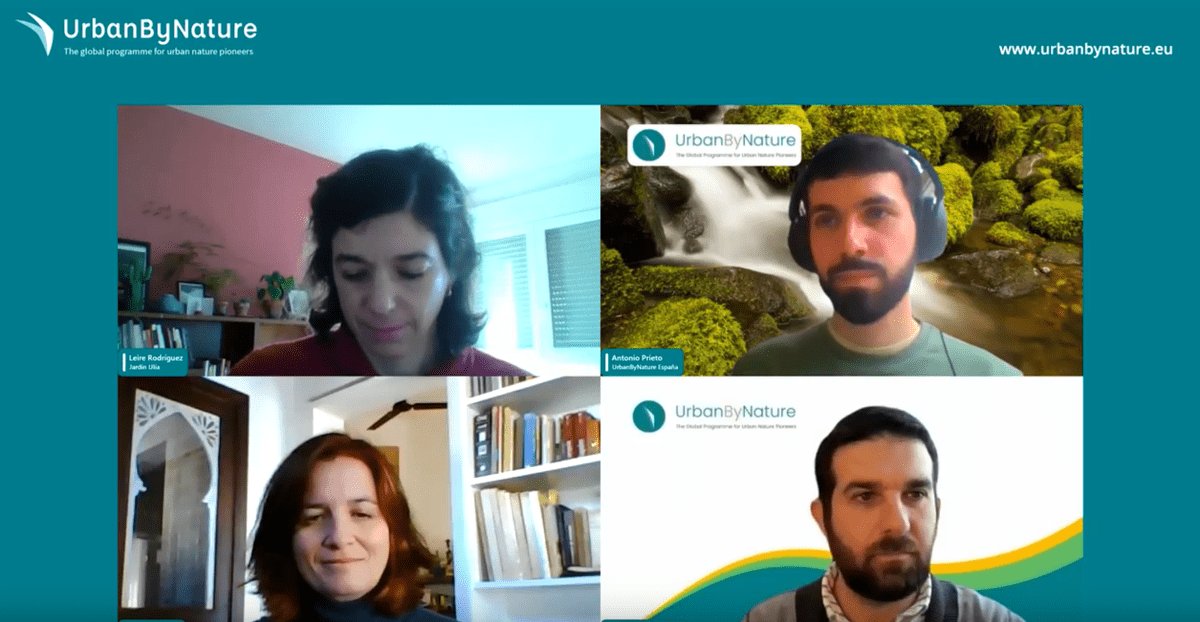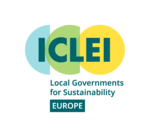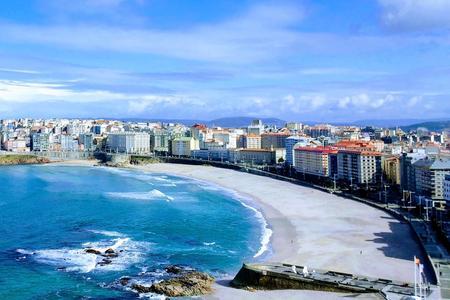UrbanByNature Spain: New European Bauhaus

The second UbN Spain webinar took place on 12 January, with a New European Bauhaus focus, moderated by Antonio Prieto, architect and urban planner and coordinator of the Spanish Hub of UrbanbyNature. This initiative seeks to build more sustainable, aesthetic and inclusive cities and communities.
Esther Fontán Prado, Councilor for the Environment and Sustainability of the A Coruña City Council, welcomed the attendees and explained the strategic importance of this initiative for Spanish cities.
Nicolas Chesnel, Project Officer of the European Urban Initiative (EUI) spoke next about the first EUI call for proposals for innovative actions. Chesnel explained how the EUI offers funding opportunities to cities to develop innovative proposals aligned with the principles of the New European Bauhaus, providing information on successful projects that have received funding in the past.
Subsequently, Elena Escudero Álvarez, external researcher at the University of Almería and coordinator of the Células de Gaia project, spoke about this project, selected in the first call to support local initiatives of the New European Bauhaus, which consists of the Construction of houses in Níjar (Almería) for seasonal workers who work in the fields, using the superadobe construction technique. The project seeks to provide a solution to the housing needs of this population, improving the aesthetics of the settlements and promoting environmental sustainability. These are buildings that cover all the necessary parameters in terms of health, energy and thermal efficiency, constituting a dignified, effective, aesthetic, participatory and sustainable solution to a serious problem of social inclusion.
In the third speech, Leire Rodriguez, a graduate in Environment from the UPV and facilitator at EHKOlektiboa Elkartea, spoke about the Jardines Ulía project, in Donostia, a project that won an award at the NEB 2021 awards in the category of 'Reinvented places to meet and share '. The project consists of the recovery of an old municipal nursery for its use as a community urban garden, managed through a group of volunteers who energize the space and organize activities to open it up to the public. It is an urban regeneration project and agroecological community action that seeks to weave new relationships between committed citizens, integrating the care of nature as a vehicular axis.
Following on the topic of urban gardens, Francisco José Pazos García, Environmentalist, member of the Institute for Local Development (UHU) and founding partner of Nomad Garden, spoke about the Gardens in the Air project. This project won the New European Bauhaus 2021 award in the category 'Renovated buildings with a circular spirit'. The project consists of the installation of vertical gardens in the Tres Barrios-Amate neighborhood, in Seville (Spain), taking advantage of the air conditioning structures and recycling their water to create biodiverse urban ecosystems. The initiative includes a broad participatory process to involve the local community, as well as highly innovative activities, such as the creation of a perfume that captures the aromas of the neighborhood, or musical compositions representing its sounds. Art plays a fundamental role in the project, with activities to energize the neighborhood that included reading stories by candlelight and polyphonic concerts. Francisco Pazos also spoke about how the project seeks to improve the quality of life of the local community and contribute to environmental sustainability.
In the discussion session, the panelists shared their experiences on the ground and talked about the difficulties and challenges they encountered, such as the importance of involving the community and the need to ensure the long-term sustainability of the projects. The attendees had the opportunity to ask questions and discuss issues related to the New European Bauhaus and how it can be applied in their own cities. Nicolás Chesnel answered questions about the specific requirements of the EUI call, such as the size of the candidate cities or the importance of involving the public. Elena Escudero spoke about some of the legal barriers that the Gaia cells project faces when it comes to legalizing bioconstruction structures, and about the strategy that has been followed to resolve them. For his part, Francisco Pazos answered some questions about the economic scope of the intervention carried out in the Jardines en el Aire project.
All videos from the webinar are available on the CitiesWithNature YouTube channel. To find out more about upcoming events and receive our monthly UrbanByNature Digest newsletter, we invite you to complete the registration form on the UrbanByNature website.
Original (Español)
El pasado 12 de enero tuvo lugar el segundo webinar de UBN España, que estuvo centrado en la Nueva Bauhaus Europea, una iniciativa que busca construir ciudades y comunidades más sostenibles, estéticas e inclusivas. El webinar estuvo moderado por Antonio Prieto, arquitecto y urbanista, y coordinador del Hub español de UrbanByNature.
Esther Fontán Prado, concejala de Medio Ambiente y Sostenibilidad del Ayuntamiento de A Coruña, dio la bienvenida a los asistentes y explicó la importancia estratégica de esta iniciativa para las ciudades españolas.
A continuación, en la primera presentación del día, Nicolas Chesnel, Project Officer de la European Urban Initiative (EUI), habló sobre la primera convocatoria de propuestas EUI para acciones innovadoras. Chesnel explicó cómo la EUI ofrece oportunidades de financiación a las ciudades para desarrollar propuestas innovadoras alineadas con los principios de la Nueva Bauhaus Europea. Presentó los criterios de evaluación para las propuestas y los detalles de la convocatoria, incluyendo las fechas límite y los requisitos para los solicitantes, y proporcionó información sobre proyectos exitosos que recibieron financiación en el pasado.
En la segunda intervención, Elena Escudero Álvarez, investigadora externa de la Universidad de Almería y coordinadora del proyecto Células de Gaia, habló sobre este proyecto, seleccionado en la primera convocatoria de apoyo a las iniciativas locales de la Nueva Bauhaus Europea, que consiste en la construcción de viviendas en Níjar (Almería) para los temporeros que trabajan en el campo, utilizando la técnica constructiva del superadobe. El proyecto busca dar una solución a las necesidades habitacionales de esta población, mejorando la estética de los asentamientos y promoviendo la sostenibilidad ambiental. Se trata de edificaciones que cubren todos los parámetros necesarios en cuanto a salubridad, eficiencia energética y térmica, constituyendo una solución digna, eficaz, estética, participativa y sostenible a un grave problema de inclusión social.
En la tercera intervención, Leire Rodriguez, Licenciada en Medio Ambiente por la UPV y dinamizadora en EHKOlektiboa Elkartea, habló sobre el proyecto Jardines Ulía, en Donostia, un proyecto galardonado en los premios NEB 2021 en la categoría de ‘Lugares reinventados para reunirse y compartir’. El proyecto consiste en la recuperación de un antiguo vivero municipal para su uso como huerto urbano comunitario, gestionado a través de un grupo de voluntarios que dinamiza el espacio y organiza actividades para abrirlo a la ciudadanía. Se trata de un proyecto de regeneración urbana y acción comunitaria agroecológica que busca tejer nuevas relaciones entre ciudadanos comprometidos, integrando el cuidado de la naturaleza como eje vehicular.
En la cuarta intervención, Francisco José Pazos García, Ambientólogo, miembro del Instituto de Desarrollo Local (UHU) y socio fundador de Nomad Garden, habló sobre el proyecto Jardines en el Aire. Este proyecto obtuvo el premio Nueva Bauhaus Europea 2021 en la categoría ‘Edificios renovados con espíritu circular’. El proyecto consiste en la instalación de jardines verticales en el barrio de Tres Barrios-Amate, en Sevilla, aprovechando las estructuras del aire acondicionado y reciclando su agua para crear ecosistemas urbanos biodiversos. La iniciativa incluye una amplio proceso participativo para implicar a la comunidad local, así como actividades muy innovadoras, como la creación de un perfume que captura los aromas del barrio, o composiciones musicales representando sus sonidos. El arte juega un papel fundamental en el proyecto, con actividades para dinamizar el barrio que incluyeron la lectura de relatos a la luz de las velas y conciertos polifónicos. Francisco Pazos también habló sobre cómo el proyecto busca mejorar la calidad de vida de la comunidad local y contribuir a la sostenibilidad ambiental.
En la sesión de discusión, los panelistas compartieron sus experiencias sobre el terreno y hablaron sobre las dificultades y desafíos que encontraron, como la importancia de involucrar a la comunidad y la necesidad de asegurar la sostenibilidad a largo plazo de los proyectos. Los asistentes tuvieron la oportunidad de hacer preguntas y discutir temas relacionados con la Nueva Bauhaus Europea y cómo se puede aplicar en sus propias ciudades. Nicolás Chesnel respondió a preguntas sobre los requisitos específicos de la convocatoria EUI, como el tamaño de las ciudades candidatas o la importancia de involucrar a la ciudadanía. Elena Escudero habló sobre algunas de las barreras legales que enfrenta el proyecto de las células de Gaia a la hora de legalizar las estructuras de bioconstrucción, y sobre la estrategia que se ha seguido para resolverlo. Por su parte, Francisco Pazos respondió a algunas preguntas sobre el alcance económico de la intervención realizada en el proyecto Jardines en el Aire.
Todos los vídeos del webinar están disponibles en el canal de Youtube de CitiesWithNature. Para obtener más información sobre próximos eventos y recibir nuestro boletín mensual UrbanByNature Digest, te invitamos a completar el formulario de registro en la web de UrbanByNature.
Related Hubs

Our partners












The UrbanByNature programme is funded by the Horizon 2020 Framework Programme of the European Union under Grant Agreements No. 730222 and No. 776604. It has received funding for an update by the Horizon Europe Programme under the Grant Agreement No 101003818. The sole responsibility for the content of this website lies within UrbanByNature and in no way reflects the views of the European Union.
